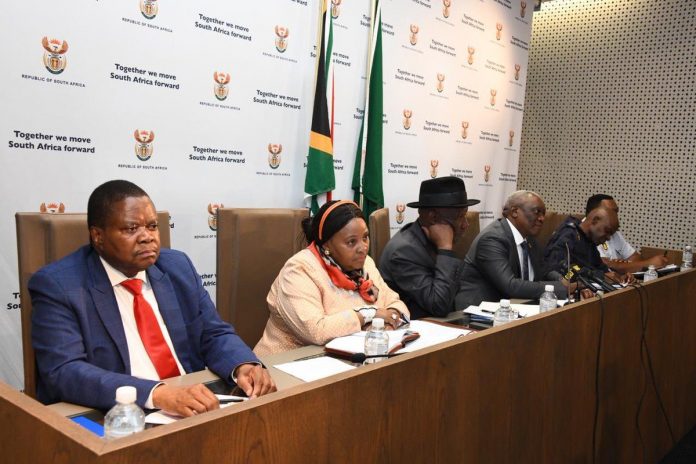The country’s security cluster is examining lessons from the recent high-level joint operation to counter the EFF-led nationwide shutdown as a future model for fighting ordinary crimes.
According to government insiders, the “intelligence-driven” special operation was a huge success and squashed any potential anarchy the red berets may have contemplated.
The government pad itself on the back in a cabinet statement last Wednesday, praising the efforts of the justice, crime prevention and security (JCPS) cluster and the national joint operational and intelligence structure (Natjoints) in ensuring that the protest action passed without major incidents.
“Whilst acknowledging that operations of that nature cannot be mounted on a daily basis, cabinet has directed that the JCPS cluster develops and tables an integrated and intelligence-led crime prevention plan to urgently and effectively deal with organised crime, safety, and security of people in South Africa,” said Minister in the Presidency Khumbudzo Ntshavheni.
“Cabinet expressed its appreciation of the solidarity shown by the majority of South Africans in rejecting the calls for a shutdown and protecting our constitutional democracy.”
A high-ranking security official said this week that unlike in the past, the security cluster ministers’ work had features of coordinated communication, timely response, and improved collaboration among the different portfolios watching the country’s security.
“They knew they could not ignore intelligence reports from other institutions. And this time all briefing reports were shared with the police ministry through a delegated person,” the official said.
“And there was open criticism of each other. When one agency is not happy with the quality of a briefing report, they will openly admit that they are not happy because the report lacks the following things.
“When the report is shared, they will follow up on why there is no response. Everybody had to bring their A-game.”
“It is also a personality issue and how people operate. The operation involved coordination and needed a strong coordinator behind the wheel,” said another person, adding that the decision to house the State Security Agency under the Presidency provided the agency with a more central role.
Among the examples mentioned was the decision to free up squads of police officers stationed at national key points including airports and ports across the country, which are not high-traffic areas, and instead have the army take over those duties.
“There are no masses at national key points. You cannot say soldiers will overreact and be trigger-happy. And that worked,” said the security insider.
“Then we kept soldiers on standby in volatile areas like Phoenix in KwaZulu-Natal and Soweto in Gauteng.”
The person continued: “In case of anything, they were combat-ready. But they were not the first to react. But if you put a truck blocking the road, the soldiers would remove the obstruction.”
In a statement last week, Natjoints said it was “satisfied with the manner in which the integrated law-enforcement deployments have exercised their authority in ensuring law and order in the country thus far”.
Police spokesperson Brigadier Athlenda Mathe said: “Through its respective provincial joints across the country, the Natjoints working closely with various stakeholders in the security cluster has ensured maximum mobilisation of resources to heighten police visibility with a view of preventing acts of lawlessness and criminality.”
Through intelligence-driven operations, added Mathe, “the swift response by members of the South African Police Service and other law-enforcement agencies to pockets of opportunistic criminality is commended”.
“The secondary support role of the South African National Defence Force in assisting the work of the police by protecting critical infrastructure such as ports of entry, toll roads, and harbours has also yielded positive results.”
Mathe said private security’s role in resource sharing and as a force multiplier on the ground also played a major role in ensuring law-enforcement visibility.
Follow @SundayWorldZA on Twitter and @sundayworldza on Instagram, or like our Facebook Page, Sunday World, by clicking here for the latest breaking news in South Africa. To Subscribe to Sunday World, click here



